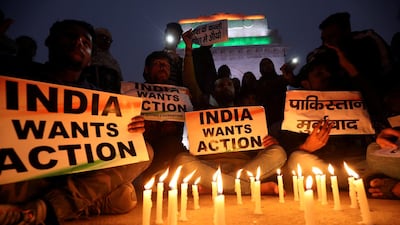Prime Minister Narendra Modi’s government plans to divert water from Pakistan as India continues to look for non-military ways to punish its neighbour for a deadly terrorist attack in Kashmir.
India on Thursday announced projects that will stop its share of water in the Indus river basin from flowing into Pakistan, Water Minister Nitin Gadkari said in a series of tweets. The projects will shift waters from the Ravi and Beas rivers for use in the states of Punjab and Jammu and Kashmir.
“By diverting the water, India is sending a clear message to Pakistan,” said Uttam Sinha, a senior researcher at the Institute for Defence Studies and Analyses in New Delhi. The step will prevent large quantities of India’s share that currently flows freely to the neighbor, he said.
The decision comes after 40 paramilitary soldiers in Kashmir were killed in an attack last week claimed by Jaish-e-Mohammed, a Pakistan-based terror group. It was the worst strike since Mr Modi came to power in 2014 and comes just months before the India's general election. New Delhi has blamed Islamabad for the attack, although Pakistan’s government has denied any role.
India, which threatened to review the 1960 Indus Waters Treaty after a previous attack in Kashmir, is desperate to find ways to pressure Islamabad short of military strikes. So far, it has moved to isolate Pakistan diplomatically by scrapping the most favoured nation status it granted and slapping 200 per cent duties on imports.
New Delhi and the US blame Pakistan for harbouring terrorists seeking to destabilise its neighbours. But with both the South Asian nations armed with nuclear weapons, the fear of military escalation limits India’s response.
On Thursday, Mr Gadkari said work on the stalled Shahpur-Kandi dam had already begun. Along with a reservoir project using water from the Ujh, the Ravi’s main tributary in Kashmir, India will also link the Ravi and Beas rivers to divert their waters to other basin states, he said.
The projects are in accordance with the Indus Waters Treaty on sharing waters of the river basin, a senior water ministry official said. The projects, which will take between one-and-a-half to six years for completion, will stop water that is rightfully India’s share, the official said.
The treaty covers the water distribution and sharing rights of six rivers in the basin. Pakistan was allotted three western rivers – the Indus, Jhelum and Chenab – for exclusive use, while India retained the Sutlej, Beas and Ravi that flow eastward. India could also use some of the water from the western rivers for irrigation purposes even though it could not store any water or build any structure for storage.
The six rivers that form the Indus river basin have been a potential point of conflict between the neighbours despite the five-decade-old treaty. India had in 2016 said it would review the treaty after 19 Indian soldiers were killed in Kashmir, a disputed region which is claimed in full by both countries. Pakistan has repeatedly complained about India’s plans to build dams on the rivers. Yet annual talks have remained relatively unaffected in spite of two wars fought since the treaty was put in place.

